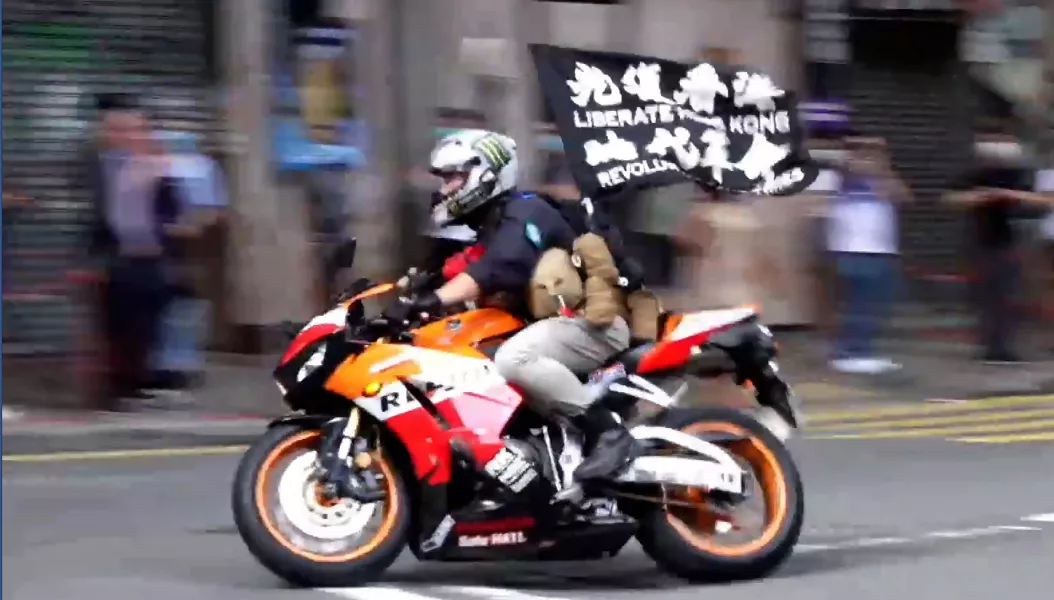A pro-democracy protester has been sentenced to nine years in prison in the first case under Hong Kong’s new national security law as Beijing tightens control over the territory.
Tong Ying-kit was convicted on Tuesday of inciting secession and terrorism for driving his motorcycle into a group of police officers during a rally on July 1 2020.
He carried a flag bearing the banned slogan: “Liberate Hong Kong, revolution of our times.”
The ruling Communist Party imposed the security law on the former British colony last year following anti-government protests that erupted in mid-2019.

Beijing has tried to crush a pro-democracy movement by jailing leading activists and has reduced the public’s role in picking Hong Kong’s government.
Tong’s sentence, announced by Judge Esther Toh on behalf of a three-judge panel in the Hong Kong High Court, was longer than the three years requested by the prosecution.
Defence lawyers appealed for no more than 10 years. Tong had faced a possible maximum of life in prison.
The court’s ruling said the sentence reflected “the abhorrence of society”.
Critics accuse Beijing of violating the autonomy and western-style civil liberties promised when Hong Kong returned to China in 1997 and hurting its status as a business centre. Human rights activists say the security law is being abused to attack legitimate dissent.
Amnesty International’s Asia-Pacific regional director Yamini Mishra said Tong’s sentencing is a “hammer blow to free speech”, and shows the legislation is “a tool to instil terror” in government critics.

She said the law “lacks any exemption for legitimate expression or protest”, adding: “The judgment at no point considered Tong’s rights to freedom of expression and protest.”
The US government criticised the “unjust outcome” of Tong’s trial and said the security law was used “as a political weapon to silence dissenting voices”.
It said in a statement that China was undermining rights guaranteed by Hong Kong’s mini-constitution, the Basic Law, and by the 1984 Chinese-British Joint Declaration on the territory’s return.
It called on Beijing to “stop targeting individuals exercising their rights and freedoms”.
Chinese officials reject the criticism and say Beijing is restoring order and instituting security protections like those of other countries. More than 100 people have been arrested under the security law.
The judges ruled Tuesday that Tong’s actions were an act of violence aimed at coercing the Hong Kong and mainland governments and intimidating the public.
📢NEW REPORT📢
Hong Kong's National Security Law has created a human rights emergency https://t.co/pdOJTWVV12— amnestypress (@amnestypress) June 30, 2021
It said carrying the flag was an act of incitement to secession, rejecting defence arguments that Tong could be proven to be inciting secession just by using the slogan.
Tong’s trial was conducted without a jury under rules that allow an exception to Hong Kong’s British-style common law system if state secrets need to be protected or foreign forces are involved. The judges were chosen by Hong Kong chief executive Carrie Lam.
The crackdown followed protests that began over an extradition law proposed by Ms Lam’s government and expanded to include other grievances and demands for more democracy.
At their height, thousands of people held marches and rallies every weekend.
The last pro-democracy Hong Kong newspaper, Apple Daily, shut down last month after journalists and executives were arrested.
Its owner, Jimmy Lai, is serving a 20-month prison term and faces more charges of colluding with foreigners to endanger national security.
Also last year, Hong Kong’s legislature was rearranged to guarantee a majority to Beijing-allied figures. Rules for elected officials were tightened to require them to be deemed patriotic.







